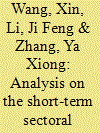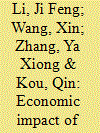|
|
|
Sort Order |
|
|
|
Items / Page
|
|
|
|
|
|
|
| Srl | Item |
| 1 |
ID:
107495


|
|
|
|
|
| Publication |
2011.
|
| Summary/Abstract |
Market-based instruments, particularly carbon tax, have recently drawn the attention of Chinese government by their cost-effective contribution to the achievement of China's climate targets. Most of the recent policy proposals have focused on its long-term impact. However, particularly for policy makers, both long term and short term effects of carbon tax would be necessary when determining tax rates. We provided a detailed analysis of short-term impacts of carbon tax on sectoral competitiveness in this paper. We divided China's economy into 36 sectors, based on its 2007 input-output table, in order to examine the ratio of carbon tax added costs to sector GDP. We were thus able to determine the impact level of a carbon tax on each sector. We then divided the sectoral trade impact into domestic competitiveness with regards to foreign imported products and international competitiveness external to the Chinese domestic market. We found that a high tax level (100 yuan/t CO2) may necessitate compensatory measures to certain highly affected industries, and that a low tax rate (10 yuan/t CO2) would generate few competitiveness problems for all industries and may therefore be considered as an appropriate starting point.
|
|
|
|
|
|
|
|
|
|
|
|
|
|
|
|
| 2 |
ID:
080718


|
|
|
|
|
| Publication |
2008.
|
| Summary/Abstract |
The newly emerging middle-income stratum represents China's economic and academic elite. Civic attributes and the role the middle class plays in the process of social transformation in China have remained overlooked. This study examines the consciousness of self-identity and social affairs of this middle stratum. Surveys are drawn from two cities in China, Beijing and Shanghai. The result reveals that the majority of respondents are uncertain about their identity of being in the middle-income stratum. However, research shows that while this group shares many social traits in common-a high level of educational attainment and professional skills, and a strong interest in social and public affairs-there has been no sign that this group will function as a social group yet. Social behaviors of the middle-income stratum demonstrate strong individual endeavors rather than coordinated efforts of this newly emerging social group
|
|
|
|
|
|
|
|
|
|
|
|
|
|
|
|
| 3 |
ID:
136192


|
|
|
|
|
| Summary/Abstract |
We use a dynamic CGE model (SICGE) to assess the economic and climate impacts of emissions trading system (ETS) in China with a carbon price of 100 Yuan/ton CO2. A particular focus is given to the regulated electricity price regime, which is a major concern of electricity sector’s cost-effective participation in ETS in China. We found: (1) Carbon pricing is an effective policy for China to reduce CO2 emissions. Total CO2 emissions reduction ranges from 6.8% to 11.2% in short-term. (2) Rigid electricity price entails lower CO2 emissions reduction but can be considered as a feasible starting point to introduce carbon pricing policies in short-term as long as governmental subsidies are given to electricity production. (3) In mid- and long-term, the efficient policy is to earmark carbon revenue with competitive electricity price. We propose to use carbon revenue to reduce consumption tax in the first year of the introduction of carbon price and to use the carbon revenue to reduce production tax in following years.
|
|
|
|
|
|
|
|
|
|
|
|
|
|
|
|
| 4 |
ID:
111357


|
|
|
|
|
| Publication |
2012.
|
| Summary/Abstract |
The twelfth five-year plan (FYP) endorsed by the People's National Congress in March 2011 plays a crucial role in shaping China's development trajectory over the next decades , and especially for the fulfillment of the 40-45 carbon intensity reduction target by 2020. The plan will condition both the medium and long term perspectives of economic restructuring, rebalance between the inclusive economic growth and environmental objectives, which are compounded by multiple constraints faced by China such as aging population, natural resources depletion, energy supply security and environmental deterioration. This article investigates the major energy and climate targets and actions specified in the 12th FYP to gain insights into the nature and magnitude of challenges and difficulties with regard to the medium and long run economic and environmental policies. It points out that China should articulate sectoral policies with the global climate mitigation targets to avoid long term carbon lock-in. Based on an in-depth analysis of the objectives in the plan, it is argued that the implementation should include mainstreaming developments of appropriate instruments to support cost-effective energy efficiency improvements and carbon intensity reduction in the next five years.
|
|
|
|
|
|
|
|
|
|
|
|
|
|
|
|
| 5 |
ID:
112719


|
|
|
|
|
| Publication |
2012.
|
| Summary/Abstract |
China's over 25% aggregate household saving rate is one of the highest in the world. One popular view attributes the high saving rate to fast-rising housing prices in China. However, cross-sectional data do not show a significant relationship between housing prices and household saving rates. This article uses a simple consumption-saving model to explain why rising housing prices per se cannot explain China's high household saving rate. Although borrowing constraints and demographic changes can translate housing prices to the aggregate saving rate, quantitative simulations of our model using Chinese time-series data on household income, housing prices, and demographics indicate that rising mortgage costs can increase the aggregate saving rate by at most 2 to 4 percentage points in the best down-payment structure.
|
|
|
|
|
|
|
|
|
|
|
|
|
|
|
|
| 6 |
ID:
136191


|
|
|
|
|
| Summary/Abstract |
We examine the challenges and opportunities to introduce emissions trading (ETS) in China’s electricity sector, in which the interaction between ETS and electricity market reform plays a major role. China’s electricity sector is currently in a slow progress towards a more competitive and market-based system. Both equal share dispatching policy and regulated wholesale and retail pricing policies pose significant challenges for implementation of ETS in China’s electricity sector. One of the important points of ETS is to give a price for carbon emissions and establish a cost pass-through mechanism (reminded that the essential of carbon pricing is to put a price on carbon emissions that is equal to discounted value of the external damages). It should be regarded as a part of broader policy package for energy and resources price reform. This will require that any low-carbon power policy should be considered as a part of whole policy package aiming at further liberalizing the electricity sector in China. Three policy options are identified to incorporate ETS with electricity reform under different circumstances. A combination of those three options is also proposed to break the lock and reinforce the positive interaction between ETS and the transition towards a competitive electricity system, in link with current pilot ETS designs. A roadmap to introduce ETS in a stepwise manner is suggested.
|
|
|
|
|
|
|
|
|
|
|
|
|
|
|
|
| 7 |
ID:
110421


|
|
|
|
|
| Publication |
2011.
|
| Summary/Abstract |
A transparent and comprehensive statistical system in China would provide an important basis for enabling a better understanding of the country. This paper focuses on energy intensity (EI), which is one of the most important indicators of China. It firstly reviews China's GDP and energy statistics, showing that China has made great improvements in recent years. The means by which EI data are released and adjusted are then explained. It shows that EI data releases do not provide complete data for calculating EI and constant GDP, which may reduce policy transparency and comprehensiveness. This paper then conducts an EI calculation method that is based on official sources and that respects the data availability of different data release times. It finds that, in general, China's EI statistics can be considered as reliable because most of the results generated by author's calculations match the figures in the official releases. However, two data biases were identified, which may necessitate supplementary information on related constant GDP values used in the official calculation of EI data. The paper concludes by proposing short- and long-term measures for improving EI statistics to provide a transparent and comprehensive EI indicator.
|
|
|
|
|
|
|
|
|
|
|
|
|
|
|
|
| 8 |
ID:
088510


|
|
|
|
|
| Publication |
2009.
|
| Summary/Abstract |
As the main beneficiaries of the economic reforms, members of China's middle class are primarily preoccupied with maintaining their status. Participation in politics is not high on their agenda. The mass media in China has become apolitical, largely to cater to the middle class' consumer and popular culture. It is in fact weakening the political and civic interests of the middle class, reducing their motive for direct political participation or interaction with the government.
|
|
|
|
|
|
|
|
|
|
|
|
|
|
|
|
|
|
|
|
|